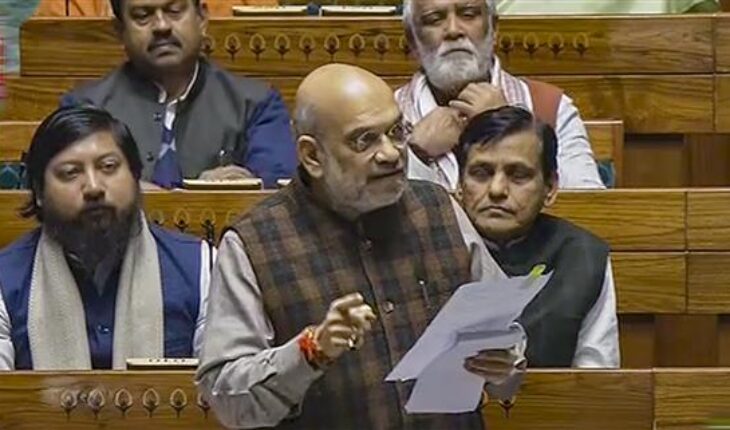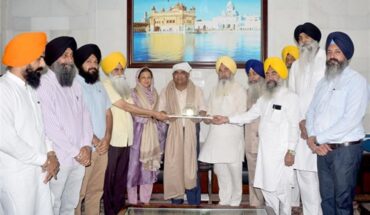New Delhi : The ‘Criminal Law Bill’ is passed in the Loksabha today and tomorrow it will be passed in the Rajyasabha also. Union Home Minister Amit Shah introduced three bills in the opposition-free Lok Sabha on the thirteenth day of the winter session, on Wednesday. The bills were passed within hours time. It should be noted that three bills were presented in the Lok Sabha once before. There are several amendments recommended after that the bill was introduced on this day.
A total of 97 opposition MPs from Loksabha have been suspended since the start of the winter session. More 2 MPs were suspended on Wednesday also till around noon. After that, the Home Minister started discussing the ‘Criminal Law Bill’ in a practically without presence of the opposition in Loksabha. He said that these three bills have been prepared by giving priority to the Indian Constitution. Along with the development of our people, Indianness has also been given importance in the new bills.
It is to be noted that Shah introduced three revised criminal law bills, namely, the Bharatiya Nyaya (Second) Sanhita, proposing to replace the Indian Penal Code, the Bharatiya Nagarik Suraksha (Second) Sanhita, proposing to replace the Code of Criminal Procedure, and the Bharatiya Sakshya (Second) Sanhita, which seeks to replace the Indian Evidence Act at the last day of the last session of the Parliament. The bills were then referred to the Parliament’s Standing Committee on Home Affairs for discussion. The anti-ruler conflict also peaked during the committee meeting. The bills were passed along with certain new amendments moved by Union Home Minister Amit Shah. One of the amendments relate to giving exemptions to doctors in cases of death due to medical negligence.
The proposed criminal law bills have been under scrutiny, with concerns raised previously by opposition leaders such as Adhir Ranjan Choudhary and Senior Advocate & Former Minister & MP Kapil Sibal, who have highlighted potential violations of human rights and the inadequacy of safeguards against excesses by law enforcement agencies. The members of the ruling Bharatiya Janata Party (BJP) and its allies, however, have defended the bills, saying that while the extant British-era criminal laws are centred around punishment and deterrence, the proposed bills shift the emphasis to justice and reformation, keeping with the changing needs of modern-day India. Endorsing the bills, Biju Janata Dal legislator Bhartruhari Mahtab reasoned during the debate on the bills, “It is imperative that our outlook is changed and that law and order is viewed outside the colonial lens.”
BJP Member of Parliament (MP) Tejasvi Surya, explained that the bills are an attempt to make the citizen the centre of the criminal justice system. “Swarajya has finally attained true meaning because our country is moving towards respecting swabhasha, swadharma, and swadesha,” the said. The bills’ focus on digitisation and information and communication technology, among other things, gained the members’ approval. “This is the age of communication and technology, and communication and technology is power,” said senior advocate and former law minister Ravi Shankar Prasad.
Prasad pointed out that while there were 511 sections in the IPC, the corresponding new bill has 356. He said while 176 sections have been changed completely, eight new have been added. He also pointed out that 22 sections have been deleted.
Dissenting voices were also conspicuously absent, apart from a handful of opposition members. Notably, All India Majlis-e-Ittehadul Muslimeen MP Asaduddin Owaisi raised concerns over the prejudice in the implementation of criminal laws against religious minorities and other vulnerable communities like Dalits and Adivasis. He also voiced his apprehensions about a provision in the Bharatiya Nagarik Suraksha Sanhita allowing police custody beyond 15 days, pointing to potential violation of civil liberties.
the Lok Sabha took up the bills, with some MPs saying these will provide justice rather than punishment and others pointing to “loopholes” that they claimed will give discretionary powers to enforcement agencies.
Shah said, he had held at least 158 meetings with regard to the three new bills and personally checked all of them in detail. “I have gone through every comma, full stop of the new criminal laws,” he added.
The minister said there will be no argument on “saving” terrorists. “I am astonished at how some people defend and save the lives of terrorists in the name of human rights when, in fact, it’s terrorism that kills not just humans but human rights as well. Remember, this is neither the rule of Britishers nor the Congress. This is the rule of the Modi government. No arguments to save terrorists will be entertained here,” he added.
In the CrPC, Shah said, there were 484 sections; now, there will be 531 sections in it. Changes have been made in 177 sections and nine new sections, 39 new sub-sections, and 44 new provisions have been added, he said. “Now, the accused will get seven days to file a plea for acquittal…The judge has to hold the hearing in those seven days and in a maximum time of 120 days, the case would come to trial. There was no time limit for plea bargaining earlier. Now if one accepts their crime within 30 days of the crime then the punishment would be less…There was no provision to present documents during trials. We have made it compulsory to produce all documents within 30 days. No delays will be made in that,” he added.




